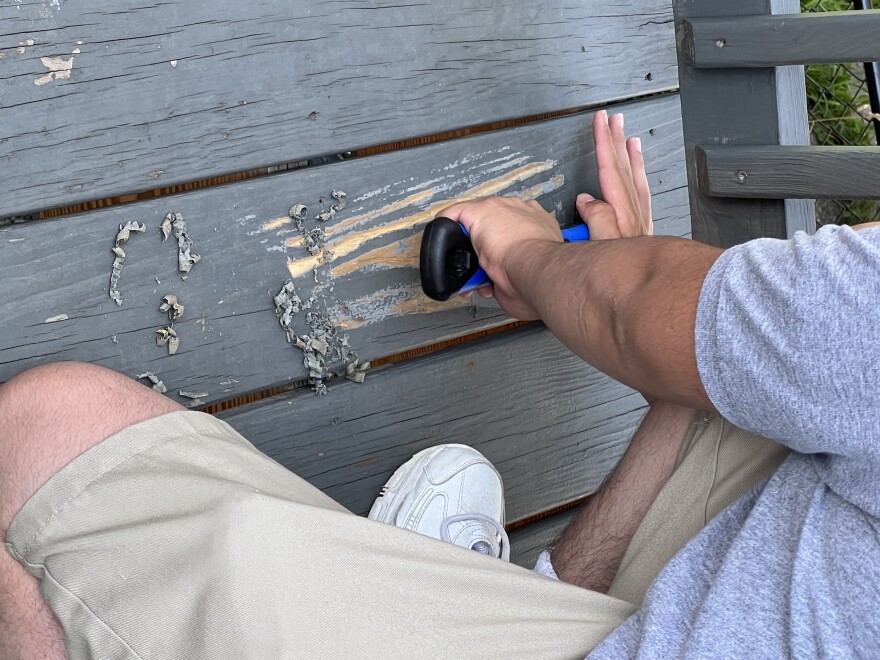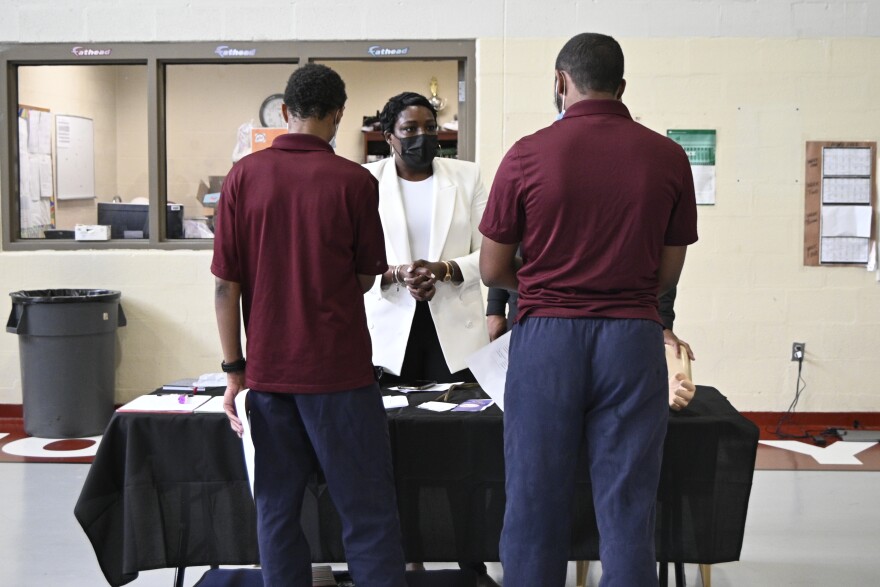An 11-year-old accused of stealing at least 16 cars. A 12-year-old shot at a football game, apparently by a teenager. Two people killed and 28 others injured at a block party in a shooting where one of the accused was just 14 years old.
Violent crime has always made headlines, but it is all the more alarming when kids and teenagers are involved, either as victims or suspects or both. In Maryland, the number of kids and teens involved in carjackings and gun violence has raised fears among the public and concern among officials since 2020, despite state data showing a drop in overall youth violence over the past decade.
At times like this, advocates, police and other officials are often heard–but rarely the youths themselves. So NPR's Michel Martin spoke with a diverse group of about half a dozen teens incarcerated for violent crimes in Baltimore and rural Maryland. Most agreed to speak on the condition that only their initials be used. This is what they had to say.

At the Baltimore City Juvenile Justice Center, T.S. says he started carrying a gun when he was 12, "because I needed it," and started robbing people because he was bored and "just to have fun."
J.H. says he went from robbing cars to selling drugs to give his mother money. "It was me doing right for myself or my family," he told Morning Edition.
Maryland Department of Juvenile Services Secretary Vincent Schiraldi, who previously headed New York's notorious Riker's Island and tried to close it, says cases like these are attention grabbing but are actually outliers. The more typical cases are those of kids like K.S., who first landed in juvenile detention when he was around 10 years old after stealing a car. After several other stints in cells, K.S. calls his latest – which began before he turned 18 – "a blessing" and a wakeup call.
"Most of my charges just came from me hanging out with the wrong people. Stolen cars, stolen four wheelers, dirt bikes. I was fighting. So like most of my charges are fights," said K.S. "This is my last time. I'm starting new. Once I get out of here, I'm moving back down to Georgia and I'm starting fresh."
Under state law, 33 types of crimes automatically send kids to be tried as adults before they can enter the juvenile detention system.
In western Maryland, K.S. and other youths held at the Backbone Mountain Youth Center in rural western Maryland worked on stripping, sanding and refinishing a deck to make it safe for little kids.

During a water break, K.S., who is now 19, shares that his latest incarceration owes to assault charges stemming from an argument with his girlfriend and a neighbor that landed the man in a hospital. He hopes to ultimately return to Georgia to become a diesel mechanic, following a path carved out by his dad, sister and older brothers.
Many of the incarcerated youths said they first got in trouble because they were bored, looking for something to do, and started hanging out with other kids who were bored and restless. Others simply lacked basic necessities like enough clothes, or wanted money they otherwise lacked.
C.A. says he was first charged when he was just 15 years old. It started with intimidating people to take what he wanted and then escalated.
"[I was] just trying to get money so I could basically have clothes and stuff," he explained. "I really don't got that much pairs of shoes and stuff like clothes." He too has regrets.
"If I had the chance to redo my past, I'd definitely take a different road," he said.
Drivers of violence
These teens were embroiled in some of the carjackings, public brawls, shootings and smash-and-grab robberies that have made headlines in recent months. Kids as young as 12 have been involved, as both victims and perpetrators of violence.
Marco Thomas, a case manager supervisor with Maryland's Department of Juvenile Services, says the youths that his agency serves "are bored... they make up stuff to do... they're finding negative stuff to do to drive that adrenaline." The key, he says, is channeling that same drive.
"If we take some of that energy and use it in a positive direction, then we can start to see some progress," said Thomas.
Nationwide, the number of all arrests involving people younger than 18 reached a new low of 424,300 in 2020. That is half the number from five years earlier, according to federal statistics. Around 7.5% percent of youth arrests were for a serious violent crime like murder, robbery or aggravated assault.
But the youth share of arrests is higher for certain offenses. Youths namely account for 18 percent of all arrests — adults and people younger than 18 combined — for robbery, which includes carjacking.
Maryland has several initiatives underway to address the issue, from relatively new ones, like violence interrupters and intensive counseling, to more traditional methods, like youth curfews and putting kids in the adult system.
'Suitcase of supports'
Schiraldi, the juvenile services chief, says the state is developing a "suitcase of supports" to help pull youths out of the path of violence and reduce the rate of incarcerations.
Schiraldi points to life coaches who themselves were formerly incarcerated and now interact with incarcerated youths on a regular basis to provide support, fiscal incentives for achieving set milestones, as well as supported college attendance.
"We're seeing results already in some pockets, like West Baltimore, a one third decline" in shootings, Schiraldi said. "This used to be a shooting gallery. That neighborhood has seen results. So we need to learn those lessons and we need to do what they did there in lots of other places that have high rates of gun violence. When we do that, we'll see results."
Between 2000 and 2020, Maryland saw what Schiraldi calls a "virtuous cycle," with a more than 80% decline in youth arrests and a 70% drop in incarcerated youths. But then came the pandemic.
"Kids were disrupted from school... Successful parents were losing their jobs. Mental health issues were sort of increasing for both the young people and their families and their neighborhoods," he recalled.
"People started to arm themselves in those neighborhoods, mostly adults, but sometimes kids. And when you have a lot of people with a lot of frustration, with a lot of guns in their pocket, you stop having fist fights and you start having shootouts."
'Heartbreaking'
Thomas says kids mostly got guns from the black market or from their own parents, especially if guns at home were not properly secured.
"I walk around with a folder full of kids who have been shot on my caseload since I got here," he said. "It's heartbreaking. I got to not worry about the things I can't fix, like gun control and other things, and I got to focus on the kids that are most likely to come to harm or to harm somebody... and try to steer them away from that."
Reducing youth crime also requires seeing the humanity behind young people who resorted to crime and violence in moments of despair.
"These are the same kids that you're going to see at the mall, at the parks or whatever the case, and be around your children," Thomas said. "In order to make this world a better place, we need to help out all kids, regardless of where they are."
The radio version of this story was produced by Ben Abrams and edited by HJ Mai and Olivia Hampton. The digital version was edited by Treye Green.
Copyright 2023 NPR. To see more, visit https://www.npr.org.





